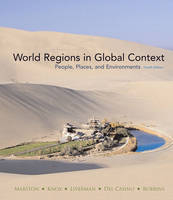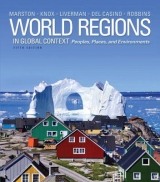
World Regions in Global Context
Pearson (Verlag)
978-0-321-65185-3 (ISBN)
- Titel erscheint in neuer Auflage
- Artikel merken
<> Sallie A. Marston received her Ph.D. in Geography from the University of Colorado, Boulder. She has been a faculty member at the University of Arizona since 1986. Her teaching focuses on the historical, social, and cultural aspects of American urbanization, with particular emphasis on race, class, gender, and ethnicity issues. She received the College of Social and Behavioral Sciences Outstanding Teaching Award in 1989. She is the author of numerous journal articles and book chapters and serves on the editorial board of several scientific journals. In 1994/1995 she served as interim director of Women's Studies and the Southwest Institute for Research on Women. She is currently a professor in the Department of Geography and Regional Development at the University of Arizona. Paul L. Knox received his Ph.D. in Geography from the University of Sheffield, England. After teaching in the United Kingdom for several years, he moved to the United States to take a position as professor of urban affairs and planning at Virginia Tech. His teaching centers on urban and regional development, with an emphasis on comparative study. He has written several books on aspects of economic geography, social geography, and urbanization. He serves on the editorial board of several scientific journals and is co-editor on a series of books on world cities. In 1996 he was appointed to the position of University Distinguished Professor at Virginia Tech, where he currently serves as Dean of the College of Architecture and Urban Studies and International Director of the Metropolitan Institute. Diana M. Liverman received her Ph.D. in Geography from the University of California, Los Angeles, and also studied at the University of Toronto, Canada, and University College London, England. Born in Accra, Ghana, she is currently the director of Oxford University's Environmental Change Institute, where she also holds Oxford University's first established Chair of Environmental Science. Previously, she was professor of geography and regional development and the director of the Center for Latin American Studies at the University of Arizona; in 1993 she received a teaching award from Pennsylvania State University. Her teaching focuses on global environmental issues and on Latin America, and she is an editor of the Journal of Latin American Geography. Diana has served on several national and international advisory committees dealing with environmental issues and has written recent journal articles and book chapters on such topics as natural disasters, climate change, and environmental policy in Mexico. Vincent J. Del Casino, Jr. received his Ph.D. in Geography from the University of Kentucky in 2000. He is currently Professor and Chair of Geography at California State University, Long Beach, where he has taught since graduating from Kentucky. He has held a Visiting Research Fellow post at The Australian National University, and completed National Science Foundation supported research in Thailand. His current research reflects his ongoing interests in the areas of social and health geography, with a particular emphasis on HIV transmission, the care of people living with HIV and AIDS, and homelessness. He has published numerous articles and book chapters on his research, and he recently completed an upper-division textbook on social geography. His teaching focuses on social geography, geographic thought, and geographic methodology. He also teaches a number of general education courses in geography, including world regional geography, which he first began teaching as a graduate student in 1995. Paul Robbins received his Ph.D. in Geography from Clark University in 1996. He has taught at the University of Arizona since 2005. Prior to this, he taught at Ohio State University, the University of Iowa, and Eastern Connecticut State University. His teaching and research focuses on the relationships between individuals (homeowners, hunters, professional foresters), environmental actors (lawns, elk, mesquite trees), and the institutions that connect them. He and his students seek to explain human environmental practices and knowledges, the influence the environment has on human behavior and organization, and the implications this holds for ecosystem health, local community, and social justice. Past projects have examined chemical use in the suburban United States, elk management in Montana, forest product collection in New England, and wolf conservation in India.
1. World Regions in Global Context
2. Europe
3. The Russian Federation, Central Asia, and the Transcaucasus
4. Middle East and North Africa
5. Sub-Saharan Africa
6. The United States and Canada
7. Latin America
8. East Asia
9. South Asia
10. Southeast Asia
11. Australia, New Zealand, and the South Pacific
| Erscheint lt. Verlag | 3.6.2010 |
|---|---|
| Sprache | englisch |
| Maße | 274 x 244 mm |
| Gewicht | 1162 g |
| Themenwelt | Naturwissenschaften ► Geowissenschaften ► Geografie / Kartografie |
| ISBN-10 | 0-321-65185-5 / 0321651855 |
| ISBN-13 | 978-0-321-65185-3 / 9780321651853 |
| Zustand | Neuware |
| Informationen gemäß Produktsicherheitsverordnung (GPSR) | |
| Haben Sie eine Frage zum Produkt? |
aus dem Bereich



